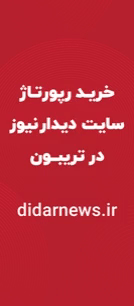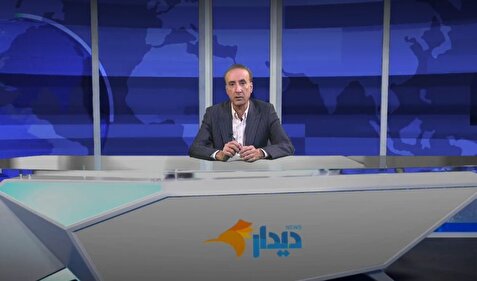

مجله خبری تحلیلی دیدارنیوز با اجرای محمدرضا حیاتی
این صد و چهل و هشتمین برنامه مجله خبری تحلیلی دیدارنیوز است که امروز دوشنبه ۲۰ بهمنماه ۱۴۰۴ با اجرای محمدرضا حیاتی و با حضور کارشناسان و صاحب نظران تقدیم مخاطبان گرامی میشود.
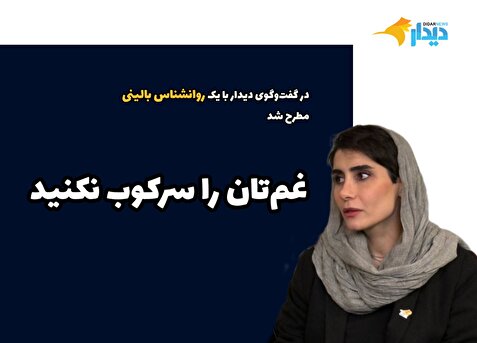
گفت و گوی دیدار در برنامه «تیتر» با یک روانشناس بالینی
الهه شعبانی: غم و اندوه خود را سرکوب نکنید/ افراد در این شرایط به نصیحت نیاز ندارند/ حرف زدن بخشی از درمان است/ از خودتان مراقبت کنید تا تاب بیاورید
«تیتر» در یکی دیگر از برنامههای خود میزبان الهه شعبانی روانشناس بالینی بود؛ با او درباره اینکه در شرایط کنونی چه باید کرد و چه نباید کرد صحبت کردیم؛ هر چند که او معتقد است نمیتوان برای همه...
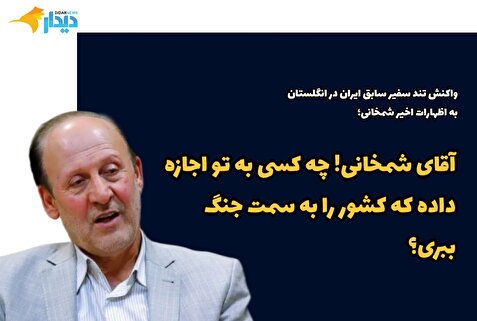
در گفتوگو با دیدار مطرح شد
واکنش تند سفیر پیشین ایران در انگلستان به اظهارات اخیر دبیر شورایعالی دفاع؛ آقای شمخانی! چه کسی به تو اجازه داده که کشور را به سمت جنگ ببری؟ / ویتکاف را به تهران دعوت کرده و در دور بعدی مذاکره به واشنگتن سفر کنید
سفیر پیشین ایران در بریتانیا در گفتوگو با دیدارنیوز با انتقاد شدید از مواضع اخیر علی شمخانی درباره قریبالوقوع بودن جنگ ایران و آمریکا گفت: آقای شمخانی! تو به هر در و دیواری زدی که بعد از دبیری...
تیتر امروز

مجله خبری تحلیلی دیدارنیوز با اجرای محمدرضا حیاتی
علی لاریجانی به عمان میرود/ ارسال تجهیزات عظیم نظامی آمریکا به منطقه/ بازداشت و احضار تعدادی از اصلاحطلبان
این صد و چهل و هشتمین برنامه مجله خبری تحلیلی دیدارنیوز است که امروز دوشنبه ۲۰ بهمنماه ۱۴۰۴ با اجرای محمدرضا حیاتی و با حضور کارشناسان و صاحب نظران تقدیم مخاطبان گرامی میشود.

گفت و گوی دیدار در برنامه «تیتر» با یک روانشناس بالینی
الهه شعبانی: غم و اندوه خود را سرکوب نکنید/ افراد در این شرایط به نصیحت نیاز ندارند/ حرف زدن بخشی از درمان است/ از خودتان مراقبت کنید تا تاب بیاورید
«تیتر» در یکی دیگر از برنامههای خود میزبان الهه شعبانی روانشناس بالینی بود؛ با او درباره اینکه در شرایط کنونی چه باید کرد و چه نباید کرد صحبت کردیم؛ هر چند که او معتقد است نمیتوان برای همه...

در گفتوگو با دیدار مطرح شد
واکنش تند سفیر پیشین ایران در انگلستان به اظهارات اخیر دبیر شورایعالی دفاع؛ آقای شمخانی! چه کسی به تو اجازه داده که کشور را به سمت جنگ ببری؟ / ویتکاف را به تهران دعوت کرده و در دور بعدی مذاکره به واشنگتن سفر کنید
سفیر پیشین ایران در بریتانیا در گفتوگو با دیدارنیوز با انتقاد شدید از مواضع اخیر علی شمخانی درباره قریبالوقوع بودن جنگ ایران و آمریکا گفت: آقای شمخانی! تو به هر در و دیواری زدی که بعد از دبیری...
Didar's exclusive interview with Hooman Majd
Hooman Majd: Needed decisions to resolve the problems of the Vienna talks will be made in the next few weeks
The case of the resurrection of Joint Comprehensive Plan of Action(JCPA) is lost in the corridors of the Grand Hotel of Vienna. It is not yet known when the seventh round of Vienna talks will begin. To discuss the situation of JPCA's case, Didar meets with Iranian-American journalist Hooman Majd.
کد خبر: ۹۹۵۳۵
۱۱:۱۱ - ۱۷ تير ۱۴۰۰
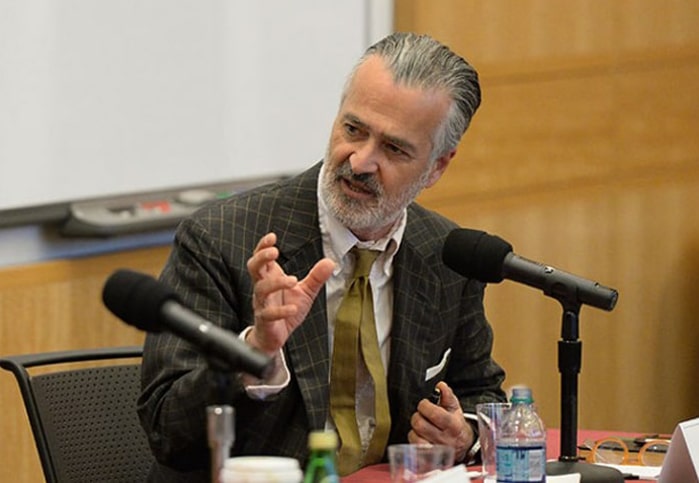
Didarnews-Parasto Bahrami-Rad: Contradictory statements by Tehran and Washington officials and the non-renewal of Tehran's agreement with the Atomic Energy Agency have led many to speculate that joint Comprehensive Plan of Action might end.
However, the two countries seem to know that the only way to reduce the region's crisis is to revive JPCA. However, in recent weeks, the level of tension between Iran and the United States has risen, and there is even the possibility of United States' withdrawl from the talks.
The United States wants to continue the talks on the missile and regional issues, and Iran wants all sanctions lifted and the United States' commitment to stay on JPCA.
Each of these teams are trying to achieve their goal with their own tactics.
To discuss the further situations of Vienna talks and the fate of the revival of "Joint Comprehensive Plan of Action" Didar meets with Hooman Majd, an Iranian-American journalist and one of the 5 + 1 negotiating team member.
Read the rest of this conversation and also see the Persian text of this colloquy here.
In your opinion, how the Vienna negotiation process went so far?
I think it has gone pretty much as expected. Many of the points of contention have been resolved, and there are only a few big issues that need decisions on. Those issues aren’t easy to agree on because both Iran and the US have legitimate concerns about how the future will look when the JCPOA is revived.
Is it possible that US withdraw from the Vienna talks?
There is always a possibility that the US could decide that the differences simply cannot be bridged and that it is not worth continuing to negotiate. That is also true of Iran. But I think it’s unlikely onb both sides as it is clearly in the interests of both (and the rest of the participants) for the JCPOA to be implemented and in effect.
In your opinion how different are this round of negotiations and is it possible to resolve them by political decisions of the two countries?
These negotiations are different from the original set of talks in that they are convened to bring the US back into a deal it had already agreed to and to have Iran reverse its remedial measures which put it out of compliance as originally envisions. This next round will be different from the previous rounds in Vienna in that both countries have had some time back in their capitals to make the political decisions necessary to conclude the negotiations successfully. It appears that there is some expectation that the next round will be the final one.
If Iran does not renew the agreement with the Atomic Energy Agency (IAEA), is it possible to end the Vienna talks without reviving the IAEA?
I believe that if the talks are successful and the US lifts the sanctions that are in violation of the nuclear deal, and if Iran agrees to reverse the remedial measures it has taken since 2019, then the Iran’s agreement .with the IAEA will be definition have to revert to compliance with the safeguards agreement and the JCPOA
Both negotiators (Iran and the United States) claimed that the other side should make a tough decision in this round of negotiations. Do you think this is a tactic or the negotiations reached a serious impasse?
I wouldn’t necessarily call it an impasse, but I also don’t think it’s necessarily a negotiating tactic. I do think there are genuine difficult political issues that must be addressed, and so assuming that those decisions can be made in the next few weeks, either the deal will go forward or it will collapse.
While Iran has repeatedly stated that they will not negotiate on missile issues and Iran's regional presence, will the Americans be willing to continue the talks and lift sanctions?
That is one of the issues that needs a political decision from both sides, i.e. for Iran and the US to decide whether there is language that they can agree to that satisfies US demands for a commitment to negotiating a “follow-on agreement” while giving Iran comfort that it hasn’t agreed to anything beyond what was originally agreed in the JCPOA. I imagine that that is possible.
In this round of negotiations, Iran demands the lifting of sanctions and expects United States not to withdraw from the UN Security Council again. Is the United States willing to give these concessions?
The US cannot give a commitment that a future US administration will never withdraw from the deal again. On this issue, there might be language that can be geared more toward sanctions relief than the deal itself, because what matters for Iran is less that the US remains a participant than the US doesn’t re-impose sanctions if it no longer is. Although it still may be impossible for the US to give the kind of guarantee that Iran is demanding now. Iran may have to be satisfied with vague language in the hope that Biden or Kamala Harris will be in the White House for the next 8 years and that as such, it may be enough time for the economy to become somewhat immune from new sanctions.
امروز سهشنبه ۲۱ بهمن
امروز سهشنبه ۲۱ بهمن
امروز سهشنبه ۲۱ بهمن
امروز سهشنبه ۲۱ بهمن

